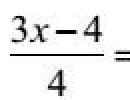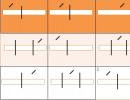German words with separable prefixes. Verbs with separable prefixes. Frame construction of prefix and verb
In addition to ordinary verbs, in German there are verbs with separable prefixes. The most surprising thing about these verbs is that the prefix “runs away” from its verb at the very end of the sentence: no matter how strange this rule may seem, it is the norm in the German language. We will talk about this norm in this lesson.
Frame construction of prefix and verb
Let's look at a few examples:
anziehen – to put on
Er zieht seine Ecke an
. — He puts on his jacket.
aufmachen - to open
Mach die Tür auf
! - Open the door!
aufstehen – to get up
Ich stehe um 7 Uhr auf
. — I get up at 7 am.
As you can see, for these verbs the prefix actually occupies the final position in the sentence and forms frame structure. A frame construction can be formed not only by a prefix, but also by a verb. Compare:
Ich mache die Tür auf. - I'll open the door.
Ich muss die Tür aufmachen. - I can open the door.
In the first case, the prefix belonged to the first (and only) verb in the sentence, which is why it “ran away” to the end of the statement, while in the second case, the same prefix belonged to the second verb, which was in an indefinite form. Having taken the final position in the sentence, this verb also formed a frame construction.
Important! The frame may expand, but is always preserved.
For example:
Ich stehe um 7 Uhr auf.
Ich stehe am Montag immer um 7 Uhr auf.
As you can see, the prefix in both cases remains in the final position in the sentence.
Remember that not all verbs have prefixes separated - this only happens with those in which the stress falls on the prefix. Accordingly, unstressed prefixes are not separated from verbs, so it is important to pay attention to how a particular verb is read and pronounced. There are prefixes that are always separable (stressed) and inseparable (unstressed).
Verbs with inseparable prefixes form participle II (third form of the verb) without a prefix ge-. For example: verstehen – verstand – verstanden (understand). Verbs with separable prefixes have a prefix ge- is added between the prefix and the verb: aufstehen – stand auf – aufhestanden.
Verbs with separable prefixes
Separable prefixes include: ab-, an-, auf-, aus-, bei-, ein-, mit-, nach-, vor-, zu-. You can see an example for each prefix in the table:
As a rule, verbs with separable prefixes denote an action associated with moving objects or changing them.
Some of these verbs have synonyms in which the prefix is not separated, for example, the verb betreten- “enter.”
Verbs with inseparable prefixes
Inseparable attachments include: ver-, be-, er-, ge-, zer-, ent-, emp-, miss-.
Verbs with inseparable prefixes are more abstract in meaning and are not associated with active actions. Unfortunately, there is no pattern between the meaning of the word and the prefix, so you just need to remember the translation.
Please note that both separable and inseparable prefixes change the meaning of the verb!
For example:
fallen - to fall.
einfallen - come to mind. Nichts fällt mir ein. - Nothing comes to mind.
auffallen - catches the eye. — Ihre musikalische Begabung fällt auf. — Her musical talent is noticeable (catchy).
gefallen (Dat.) - to like. Dein Kleid gefällt mir. — I like your dress.
Also in the German language there are verbs not only with separable prefixes, but also with separable parts, for example:
spazierengehen – to walk: Ich gehe spazieren. - I am going for a walk.
fernzehen – watch TV: Siest du fern? - You watch TV?
teilnehemen – to take part. Ich nehme an dieser Konferenz teil. — I am taking part in this conference.
Now you're familiar with some of the verbs in German, it's time to do some exercises!
Lesson assignments
Exercise 1. Group verbs with separable and inseparable prefixes.
1. mitbringen 2. bekommen 3. eintreten 4. abfahren (to leave) 5. zumachen 6. bestehen (to be) 7. gefallen 8. verstehen 9. einladen (to invite) 10. erzählen (to tell)
Verbs with separable prefixes: mitbringen, eintreten, abfahren, zumachen, einladen,
Verbs with inseparable prefixes: bekommen, bestehen, erzählen, gefallen
Meaning of prefixes
Prefixes can significantly change the meaning of a word. For example: stehen (to stand) - entstehen (to arise); machen (to do) - aufmachen (to open). However, often the prefix changes the meaning of the word only slightly. Compare: lernen (to study) - erlernen (to study, learn); hören (hear) - zuhören (listen) - abhören (listen).
Exercise 1. Use the dictionary to determine which verbs with prefixes differ significantly in meaning from the root verb:
A) stehen- bestehen, bestehen (aus), bestehen (in), bestehen (auf), entstehen, verstehen, aufstehen;
b) sprechen- besprechen, versprechen, widersprechen, aussprechen, entsprechen, nachsprechen.
Since the addition of a prefix quite often changes the meaning of a word only insignificantly, then, when reading, when you encounter an unfamiliar derivative word whose root is familiar to you, try to understand this word by its root. If this value fits the meaning given sentence, we can assume that the word is understood correctly. For example, knowing the meaning of the verb warten (to wait), but having encountered the verb erwarten (Ich erwarte meine Freundin) for the first time, you can easily guess the meaning of the verb erwarten (to wait).
If the intended meaning of the first encountered derivative word with a familiar root contradicts the meaning the entire sentence, you need to try to guess its meaning, based only on the general meaning of the entire sentence or a whole segment of text, i.e. viewing the word as completely unfamiliar. For example, in the sentence Dieses Buch gehört meiner Schwester, the verb gehören clearly has nothing in common with hören (to hear). If the meaning of the entire passage is more or less clear, one can guess that the verb gehören means “to belong” (This book belongs to my sister).
If, based on the meaning of the sentence, it is impossible to guess the meaning of a derived word with a familiar root, you have to look up its meaning in the dictionary. Consequently, in all cases, the overall meaning of the entire sentence or an entire segment of text is decisive.
Exercise 2. Indicate which of the words highlighted in the sentences can be understood without using a dictionary, and what their meanings are:
1.Der Student liest den Text laut vor. 2. Man will das Experiment in diesem Jahr durchführen. 3. Meine Uhr geht immer vor. 4. Das Wasser nimmt Schnell zu. 5. Wieich erfahre, kommt unser Rektor erst in zwei Wochen zurück. 6. Der alte Meister ist in seinem Fach sehr erfahren. 7. Ein starker Regen hört oft bald auf. 8. In der Vorlesung muss man aufmerksam zuhören.
Most prefixes are ambiguous. Only some German prefixes have a very specific meaning, i.e. unambiguous. It is easy to guess the meaning of derivative words with these prefixes.
1. Single-valued prefixes: un-, miss-, zer-, mit-
1. Set-top box un- means the negation of something: die Un ruhe - anxiety; un bekannt - unfamiliar.
2. Set-top box miss- denotes a negative, bad property of something: die Miss ernte - crop failure; der Miss erfolg - failure; miss verstehen - to misunderstand, misunderstand.
Exercise 3. Name the Russian equivalents of the following words:
unruhig, unschön, unaufmerksam, unendlich, unmöglich, das Mißverständnis, das Unglück.
3. Set-top box zer- denotes division, destruction: zer legen - decompose (into parts); zer drücken - to crush.
Exercise 4. Name the Russian equivalents of the following words:
zerfallen, zerschlagen, zerteilen, zerkleinern, zergliedern.
4. Set-top box mit- has the same meaning as the preposition mit - joint action or stay, complicity in anything: mit arbeiten - to cooperate; mit wirken - to act together, to participate in an action.
Exercise 5. Name the Russian equivalents of the following words:
mitbringen, mitfahren, mitnehmen, der Mitarbeiter, der Mitschüler, der Mitkämpfer, die Mitarbeit.
2. Multi-valued prefixes: ab-, zu-, ein-, aus-, um-, ent-, vor-
For multi-valued prefixes, we indicate only the main, most common meaning:
1. Set-top box ab- often matters removal, separation: ab fahren - to leave, ab schalten - disable.
Exercise 6. Determine which verbs the following words are formed from and name their meanings:
a) abgeben, abgrenzen, abtransportieren, abstehen;
b) die Abfahrt, der Abflug, die Abreise, die Abgabe, derAbfall, der Abstand.
2. Set-top box zu- often attaches importance additions, approximations to something (i.e. the opposite of the prefix ab-): zu fließen - to flow; zu schreiben - to attribute.
Exercise 7. Determine from which verbs the following words are formed and name their meanings:
a) zufliegen, zukommen, zufahren, zulaufen;
b) der Zugang, der Zufluss, die Zufuhr, der Zuwachs, die Zugabe.
3. Set-top box ein- usually gives the meaning of moving inside something: ein gehen - to enter; ein münden- to flow (about a river); ein saugen - to suck in.
Exercise 8. Determine which verbs the following words are formed from and name their meanings:
a) einschreiben, einführen, einbauen;
b) die Einfahrt, die Einführung, der Eingang, der Einbau.
4. Set-top box aus- most often gives the meaning of outward movement (i.e., the opposite of the prefix ein-): aus fließen - to flow out; aus schalten - turn off.
Exercise 9. Determine which verbs the following words are formed from and name their meanings:
a) ausgehen, ausstellen, aussuchen, ausfragen, aussehen, ausführen, ausfallen;
b) die Ausfahrt, der Ausflug, die Ausfuhr, der Ausgang, die Ausgabe, die Ausstellung, der Ausfall.
5. Set-top box um- often attaches importance alterations, transformations: um gestalten - transform, transform; um bauen - rebuild; um schalten - switch.
Exercise 10. Determine which verbs the following words are formed from and name their meanings:
a) umstellen, umlegen, umsetzen, umbilden, umformen, umarbeiten;
b) der Umbau, die Umbildung, die Umstellung.
6. Prefix ent- usually attaches importance disconnection, removal: entl aden - to discharge or unload (cf.: laden - to charge, load); ent misten - to cleanse from manure (cf.: der Mist - manure).
Exercise 11. Name the Russian equivalents of the following words:
entgehen, entlaufen, entnehmen, entwassern, entkraften, entfernen.
7. Prefix vor- usually has the same meaning as the preposition vor (i.e. moving or being before anything precedence): vor sehen - to provide; vor gestern - the day before yesterday.
Exercise 12. Determine which verbs the following words are formed from and name their meanings:
a) vorbereiten, vorsagen, vorschreiben, vorführen, vorstellen;
b) der Vorsitzende, die Vorstellung, das Vorjahr, der Vorsommer, der Vorgänger, der Vorgarten, das Vorwort;
c) vormittags, vorzeitig, vorgeschichtlich.
8. Prefix er- indicates 1. to completion, completeness: er bauen - to line up, er frieren - to freeze; 2. to achieve a known result:er kämpfen - to conquer; 3. to the state (when forming a verb from an adjective): er kranken - to get sick.
Keys to the exercises
1. bestehen (auf) – insist;
entstehen – to arise;
verstehen – to understand;
versprechen – to promise;
entsprechen – to correspond.
3. restless, ugly, inconsiderate, endless, impossible, misunderstanding, misfortune.
4. disintegrate, break, divide, crush, dismember.
5. bring with you, go with someone, take with you, employee, fellow student, ally, cooperation.
6. give, delimit, take, defend; departure, departure, departure, return, waste, distance (distance).
7. fly up, approach, drive up, run up; approach, influx, supply (delivery), increase, addition.
8. enter, import, build in; entry, introduction (implementation), entry, installation (mounting).
9. come out, exhibit, seek, inquire, look, take out, fall out; departure, departure, export, delivery, exhibition, dropout.
10. rearrange, shift, replant, transform, reshape, recycle; restructuring, transformation, rearrangement.
11. leave (slip away), run away, take away, drain, weaken, remove.
12. prepare, prompt, prescribe, demonstrate, present;
chairman, presentation, previous year, beginning of summer, predecessor, front garden, preface;
in the morning, in advance, prehistoric.
Step 10 - verbs with separable prefixes. What it is? Simply put, these are not even prefixes, but prepositions.
In German, as in Russian, there are prepositions, for example
auf- on
an- on, at
vor- before
zu- To
aus- from
However, prepositions can be used not only independently (for example - auf dem Tisch- on the table, nach Germany– to Germany), but also as a “lotion” to the verb. Well, or prefixes, as it is written in the grammar. For example:
auf stehen – get up
aus steigen – to go out
vor bereiten – to prepare something, to prepare
In such verbs, during conjugation, the prefix ✂ is separated and automatically moved to the last place in the sentence.
aufstehen- get up
Ich stehe auf.
Du stehst auf.
Wir stehen morgen um 7 Uhr auf.
zumachen- close something
Ich mache zu.
Du machst zu.
Er macht die Tür zu.
Wir machen die Augen zu.
List of detachable attachments
Here is a list of words that are used both independently and as a prefix to a verb:
auf-, ab-, an-, aus-, mit-, nach-, statt-, um-, vor-, weg-, weiter-, zu-, zurück-, zusammen-, heim-, durch-, über- , unter-, wieder
It is important to know that if these little words are part of a verb, then their meaning can change depending on the meaning of the verb.
In addition to these words, there are several other “lotions” that are not used separately. They are used only along with the verb and are also separated. Here is their list:
ein-, fern-, her-, hin-, teil-, zurecht-, herein-, heraus-, hinauf-, hinaus-, hinein-
More examples:
| anfang | start off | ✂ Ich fange um 9 Uhr an. |
| mitkommen | go with someone | ✂ Kommst du mit? |
| anrufen | call | ✂ Sie rufen mich jeden Tag an. |
| vorbereiten | will prepare | ✂ Ich bereite ein Dokument vor. |
| teilnehmen | participate | ✂ Wir nehmen am Konzert teil. |
Examples of use with modal verbs:
Möchtest du mitkommen? — Do you wanna come with me?
Kannst du das vorbereiten? — Can you prepare this?
Willst du morgen anrufen? — Do you want to call tomorrow?
In the indefinite form (that is, at the end of the sentence), nothing disappears from verbs.
That's all on this topic. It's important to remember that
- Only the above prefixes are separated
- all others are not separated
- detachable prefixes are always stressed
Exercises for the topic:
There is another interactive exercise.
Do you have any questions about this topic? Write in the comments.
Lesson 10: Verbs with separable prefixes was last modified: August 24th, 2018 by Catherine
In the German language, a large number of verbs have prefixes that either complement, clarify the meaning of the verb, or radically change it. To correctly find the meaning of a verb, you need to look for it in a dictionary with a prefix, for example:
Ernimmt die Zeitschrift. - You should look for nehmen (take) in the dictionary.
But: Er nimmt an der Arbeit teil . - You should look up teilnehmen (participate) in the dictionary.
Prefixes can be separable or inseparable, depending on whether the emphasis falls on them or not. Depending on this, the meaning of the verb changes.
Inseparable prefixes are always unstressed; there are 8 of them in the German language. All of them are unstressed. These prefixes give the verb a new meaning that is not derived from the meaning of the root verb.
Detachable prefixes are always stressed. When conjugating a verb in Präsens, Präterit, as well as in Imperativ, the separable prefix is placed at the end of the sentence.
Ich stehe um 7 Uhr auf. I get up at 7 am.
Dieses Thema nahmen wir schon durch. We have already covered this topic.
Machen Sie bitte die Tür zu! Close the door, please!
A number of prefixes can be either separable (in these cases the stress falls on them) or inseparable (they are unstressed). Separable prefixes, as a rule, retain their direct meaning. Inseparable prefixes give the verb a new, modified meaning.
Examples of detachable and non-detachable prefixes
durch- ´ durch brechen – to break
durch brechen – break (law)
um- ´ um gehen – to contact
um gehen – to go around
Uber- ´ übersetzen– to transport
Uber setzen – translate
unter- ´ unter schlagen – cross
unter schlagen – to conceal
wieder- ´ wieder holen – bring again
wieder holen – repeat
Exercise 1. Put the verbs given in brackets in Präsens:
1. Die Bestarbeiter (erfinden) neue Arbeitsmethoden. 2. Die Ärztin (verschreiben) mir eine Arznei gegen Husten. 3. (Beenden) du heute die Arbeit? 4. Er (empfangen) seine Gäste immer freundlich. 5. Das Ballett (gefallen) uns sehr. 6. Du (beschreiben) den Frühling auf der Krim. 7. Ihr (verstehen) mir richtig. 8. Warum (missachten) Sie ihn?
Task 2. Omit the modal verb in the following sentences and change the infinitive to the finite form of the verb:
Muster: Er kann die Arbeit fortsetzen.
Er setzt die Arbeit fort.
1. Ich will die Liste der starken Verben abschreiben. 2. Um halb vier müssen wir losfahren. 3. Du sollst morgen sehr früh aufstehen. 4. Ihr möchtet deutsche Dichter kennen lernen. 5. Wozu muss Peter am Puschkin-Platz aussteigen? 6. Die Fernstudenten sollen sich auf die Prüfung vorbereiten. 7. Der Reisende kann seine Erzählung fortsetzen, und alle wollen aufmerksam zuhören. 8. Der Sportler kann am Wettkampf nicht teilnehmen.
Exercise 3. Write a story using these expressions.
Was macht eine Hausfrau den ganzen Tag?
1. das Baby anziehen. – Die Hausfrau zieht das Baby am Morgen an.
2. das Frühstück vorbereiten
3. den Tisch abräumen
4. das Geschirr spülen und abtrocknen
5. Lebensmittel einkaufen
6. die Wäsche aufhängen
7. die Tochter vom Kindergarten abholen
8. die Wohnung aufräumen
Task 4. Insert the verb, determining the meaning of the separable or inseparable prefix.
1. (übersetzen)
a) Er Gedichte... von Heine. b) Man... uns mit der Fahre ans andere Ufer... .
2. (wiederholen)
a) Warte einen Augenblick, ich … ihn gleich … . b) Der Lehrer .. jede Frage zweimal.
a) Du ... mit deinen Sachen nicht ordentlich ... . b) Eine Landstraâe … das Dorf.
4. (überlegen)
a) Es ist kalt, ich … eine warme Jacke … . b) Der Prüfling … ein paar Minuten die Frage und antwortet richtig.
a) Das Schiff... die Insel. b) Der Radfahrer … einen Passanten … .
Task 5. Complete the sentences with verbs, using them with appropriate prefixes. Translate the sentences.
be-, ver-, ent-, aus-, an-, frei- + sprechen
1. Ich... dir das.
2. Sie...den Kollegen ihren Dank....
3. Heute Abend... wir unsere Reisepläne.
4. Das Gericht...den Angeklagten....
5. Deine Einstellung...der gesamten Situation nicht.
6. Plötzlich... mich auf der Straße ein Fremder...
ab-, zu-, teil-, ent-, an-, mit- + nehmen
1. Die Frau...die Wäsche von der Leine....
2. ... ihr die Einladung der Familie Schulze ... ?
3. Er... seiner Brieftasche einen Geldschein.
4. Warum...ihr das Kind nicht...?
5. Im März...die Tage schon merklich....
6. Viele Stadtbewohner...am Karneval....
auf-, ab-, fort-, er-, be-, ver- + setzen
1. Der alte Jäger...seine Mütze....
2. Soviel ich weiß, ... die Gruppe ihre Arbeit schon ....
3. Diese Musik... mich immer in die Zeit meiner Kindheit.
4. ... bitte zwei Plätze für uns!
5. Sie... ihre Brille... und beginnt zu lesen.
6. Diese junge Frau ... den Zwillingen Vater und Mutter.
auf-, ein-, aus-, ge-, ver-, schwer- (leicht-) + fallen
1. Wie... dir mein neuer Hut?
2. Die Fremdsprachen...ihm....
3. Sie fühlt sich sicher; das...sofort....
4. Die Deutschstunde...heute....
5. Das ist schwierig, so etwas... einem nicht gleich...!
6. Dein Ausweis...in einem Monat.
an-, aus- (ab-), ein-, aus-, ent-, er-, be- + ziehen
1. Am Samstag...die Müllers schon in ihre neue Wohnung....
2. Es ist heute sonnig und gar nicht kalt. ... du die Kleine nicht zu warm ... ?
3. Ingrid ... in ihrer Firma ein gutes Gehalt.
4. Wann ... ihr aus eurer alten Wohnung ... ?
5. Meine Tante...ihre Kinder allein.
6. Die Pflanzen...dem Boden Nährstoffe.
Task 6. Ask your communication partner:
Muster : Teilst du deine Zeit ein? – Ja, natürlich, ich teile meine Zeit immer ein.
Does he get up early?
Does he dress quickly?
Does he manage his time?
When does the first couple start at the university?
Is he often late?
Is he preparing for a seminar in the library?
Does he go out with friends in the evening?
Does he watch TV in his free time?
How quickly does he fall asleep in the evening?
Does he get enough sleep?
Test task on the topic “Detachable and inseparable prefixes”
Task 7. Form sentences, paying attention to verbs with inseparable prefixes.
1. die Universität, ihr, wann, verlassen? 2. die ausländischen Gäste, gern, besuchen, dieses Museum. 3. du, deine Gäste, immer so freundlich, empfangen? 4. er, von seiner Reise nach Spanien, was, erzählen? 5. du, unsere Freundschaft, zerstören! 6. gefallen, dein neues Kleid, gut, mir. 7. in diesem Text, nichts, ohne Wörterbuch, verstehen, ich. 8. dieses Wörterbuch, gehören, wem? 9. die Kälte, die Kinder, nicht, empfinden. 10. in der Vorstadt, eine neue Wohnsiedlung, entstehen. 11. warum, zerreißen, den Brief, das Mädchen? 12. meinem Vater, eine Arznei gegen Kopfschmerzen, verschreiben, der Arzt. 13. diese Regel, erklären, wer? 14. ihm, immer, gelingen, alles. 15. ich, sehr oft, vergessen, Namen, und, Adressen. 16. natürlich, besuchen, ihre alte Mutter, sonntags, sie.
In German, many verbs can be modified with prefixes. Thus the verb takes on a different meaning.
In conjugated forms of the verb, some prefixes are separated, such prefixes are detachable. Other prefixes in verbs are never separated; such prefixes are inseparable.
For example: anstehen – detachable attachment– ich stehe an, du stehst an, ... stand in line - I stand in line, you stand in line,.... bestehen - not detachable attachment – ich bestehe, du bestehst, ... overcome - I overcome, you overcome,....
Inseparable attachments
There are a total of 8 inseparable attachments:
be-, ge-, er-, ver-, zer-, ent-,
emp-, miss-
- These prefixes in verbs are never separated, including in the conjugated form of the verb. Inseparable prefixes are unstressed, that is, the stress falls not on the prefix, but on the root of the verb. For example: Ich bestehe die Prüfung. I will pass the exam.
- Verbs with inseparable prefixes form participle II without a prefix ge-. For example: Ich habe die Prüfung bestanden. I have passed the exam.
Detachable attachments
The most common detachable prefixes:
ab-, an-, auf-, aus-, bei-, ein-, los-, mit-, nach-,
her-, hin-, vor-, weg-, zu-, zurück-
- Separable prefixes are always stressed (ánstehen). In the conjugated form of the verb, these prefixes stand separately from the verb, usually at the end of the sentence.
For example: Ich stehe an der Kasse an. I'm standing in line at the cash register. - Verbs with separable prefixes form participle II using a prefix ge, which is added between the prefix and the verb.
For example: Ich habe an der Kasse an ge standen. I stood in line at the cash register.
Detachable and non-detachable attachments
Consoles durch-, hinter-, über-, um-, unter- can be either separable (stressed) or inseparable (unstressed).
- With some verbs these prefixes are always separable.
For example: umschauen – er schaut sich um look around - he looks around - With other verbs, these prefixes are always inseparable.
For example: umarmen – sie umarmt ihn hug - she hugs him - With some verbs these prefixes can be either separable or inseparable. In this case, verbs with a separable prefix and verbs with an inseparable prefix have different meanings.
For example: umfahren – Er fährt das Schild um. – Er umfährt das Schild. run over/pass – He runs over a road sign. - He goes around a road sign.






